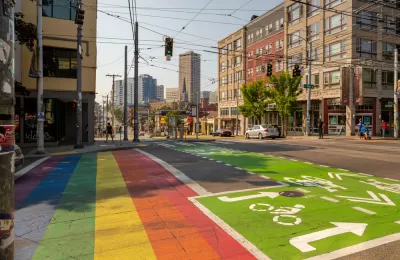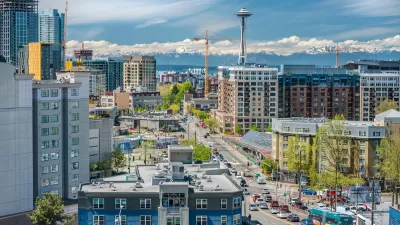A proposed transportation impact fee, years in the making, is stirring a controversy at a time of declining permitting and construction activity in the city of Seattle.

The Seattle City Council is considering transportation impact fees for development in the city.
Reporting for The Urbanist, Ryan Packer shares the background on a years-long process of exploring a new transportation impact fee, which has recently yielded a potential project list before the City Council for consideration.
Notably, Seattle has no existing impact fee—for transportation, fire protection, nor schools—like most cities in Washington State, according to Packer. Hence the cities ongoing efforts, dating back to 2014, to implement an impact fee.
There’s one big catch, however, to the idea of adding a charge on new residential or commercial construction to help fund infrastructure improvements: At the moment impact fees are under consideration by the City Council, “the City of Seattle is facing a revenue forecast that shows multifamily home construction slowing significantly, prompting the question of whether the timing is right to add yet another cost barrier onto the construction of new housing,” writes Packer.
The impact fee is currently held up by legal challenges to the Determination of Non-Significance (DNS) required by the Washington State Environmental Protection Act (SEPA).
“Until that appeal is resolved (a hearing is now scheduled for late May), Seattle cannot move beyond the initial rate study for impact fees, which includes a potential ceiling for the fee. Only certain transportation projects are eligible to be funded by impact fees, and often only certain elements of those projects as well,” reports Packer.
Impact fees are frequently provoke opposition from developers and YIMBYs for creating another expense for development projects. A lot more detail about the politics and potential consequences of the proposed impact fee can be found at the link below.
FULL STORY: As Development Slows, Seattle Eyes Transportation Impact Fee Projects

Maui's Vacation Rental Debate Turns Ugly
Verbal attacks, misinformation campaigns and fistfights plague a high-stakes debate to convert thousands of vacation rentals into long-term housing.

Planetizen Federal Action Tracker
A weekly monitor of how Trump’s orders and actions are impacting planners and planning in America.

In Urban Planning, AI Prompting Could be the New Design Thinking
Creativity has long been key to great urban design. What if we see AI as our new creative partner?

King County Supportive Housing Program Offers Hope for Unhoused Residents
The county is taking a ‘Housing First’ approach that prioritizes getting people into housing, then offering wraparound supportive services.

Researchers Use AI to Get Clearer Picture of US Housing
Analysts are using artificial intelligence to supercharge their research by allowing them to comb through data faster. Though these AI tools can be error prone, they save time and housing researchers are optimistic about the future.

Making Shared Micromobility More Inclusive
Cities and shared mobility system operators can do more to include people with disabilities in planning and operations, per a new report.
Urban Design for Planners 1: Software Tools
This six-course series explores essential urban design concepts using open source software and equips planners with the tools they need to participate fully in the urban design process.
Planning for Universal Design
Learn the tools for implementing Universal Design in planning regulations.
planning NEXT
Appalachian Highlands Housing Partners
Mpact (founded as Rail~Volution)
City of Camden Redevelopment Agency
City of Astoria
City of Portland
City of Laramie





























